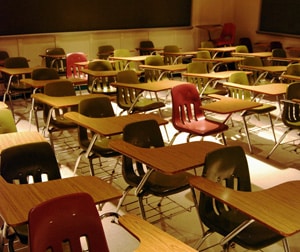
Photo by sidewalk flying/flickr.com
“Fire two teachers and call me in the morning” seems to be the cure-all that neoliberal and right-wing activists are banging their drums for. The next move after the “A-B-C-D-F” scam will be to legislate recognition of mail-order teaching degrees from online diploma mills.
Wanna bet? Recall that our secretary-designate of education has placed on her PED Advisory Board David Saba, the CEO of the American Board for Certification of Teacher Excellence, a private company and publisher of self-paced online teaching certification programs. The train is coming down the tracks right now as public schools, public-school teachers and teaching are attacked and denigrated.
Another private organization, “National Council on Teacher Quality,” has published a little document titled, a bit disingenuously, “Increasing the Odds – How Good Policies Can Yield Better Teachers.” The ultimate purpose of this document, which was published in 2004, is to disenfranchise university and college-level schools of education and, most importantly, teachers and teachers’ unions. It is a call to dumb down the practice of teaching and learning to the extent that the authors claim there is no value to be gained from teachers earning masters’ degrees.
So much for the value of education.
A manufactured stampede
A problem cannot be solved without at least some measure of understanding and historical perspective as to what exactly the nature of the problem is and how it was arrived at. In other words, what are we talking about when someone says public education is failing? The condemnation of public education is a manufactured stampede to the destruction of that institution. The public needs to ask a lot of questions about the motives and intended purposes behind this condemnation.
How are schools failing? Why are they failing? How did this all begin, when and where?
This entire early 21st Century school-reform argument is, I think, fueled by organized pretense and sophisticated public-relations propaganda. When someone presents solutions to a problem without clearly defining that problem and its nature, their motives and methods are to me suspect. When rapacious billionaires like Rupert Murdoch salivate for their piece of what they see as a lucrative education market, something other than authentic school reform is on their minds.
Last year, when Rupert acquired a school-performance tracking firm, Wireless Generation, his take was, “When it comes to K-12 education, we see a $500 billion sector in the U.S. alone that is waiting desperately to be transformed.” Murdoch later told an assembly of educational reform crusaders in San Francisco this past October, “Put simply, we must approach education… willing to blow up what doesn’t work or gets in the way.”

Emanuele Corso
This week, the Walton (Wal-Mart) family’s foundation gave $25.5 million to the KIPP charter school system. Public schools, public-school teachers and teachers’ unions beware – you are definitely in their way. You are on the target list. Duck and cover isn’t going to do it for you, either. You are going have to come out swinging if you want to survive this onslaught.
Some perspective
The problem with public education and the solution appeared with the George W. Bush administration and, as a result, we were “gifted” with the No Child Left Behind (NCLB) scam. The program, when stripped of its rhetoric, is essentially a testing regime starting with children as young as 4 years of age. Tests emanating from Washington D.C. and prepared by private testing companies, as might be expected, determined that kids were not learning to read and do arithmetic.
Soon school systems, in order to retain federal funding, were pursuing better NCLB test scores by one means or another, and you may recall the scandal that happened in Georgia. Atlanta teachers, on orders from their administrators, were altering test scores. Other teachers around the country began “teaching to the test.” Suddenly public education was on the ropes.
In my estimation, NCLB is the domestic propaganda equivalent of Iraq’s WMD – a problem created to rationalize and facilitate a “solution.” Another gift from the Bush dynasty, including brother Jeb, who overnight became an education expert. And who were the beneficiaries of this gift that keeps on giving – kids, teachers, the public?
Seed Money for Conservatives spells out who got the goodies: Shortly after the act was born in 2001, the U.S. Department of Education doled out nearly $78 billion via NCLB to “private, for-profit and/or religious schools.” The two principle actors at the Department of Education at that time were Eugene Hickok and Nina Shokraii, who both have long histories with pro-privatization outfits like the Heritage Foundation and Americans for Tax Reform.
While the Bush 2005 budget provided the smallest spending for education compared to the nine preceding years, a $50 million experiment for school vouchers was approved, diverting that money from public schools to private ones. From 2001 thru 2003, the U.S. Department of Education gave $77.76 million to various groups that were advocates for privatized education, including K12, founded by William Bennett. (Remember him?)
You might recall our current secretary-designate of education, before she was posted to New Mexico, was the CEO of Laying The Foundation, Inc., a private teacher-training company. If you have harbored any doubts about what this new wave of school reform is about, you now have a few things to think about.
What is the problem?
In the late 1800s, when mass public education was in its infancy, social needs and conditions were very different from what they are now. Public schools taught personal hygiene with as much intensity as they taught the alphabet.
Why? Because living conditions were enormously different in those times. Punctuality was a major curricular objective among the teaching objectives in city schools in those times. Why? Because employers wanted reliable employees who could be counted upon to arrive at work on time and be prepared to carry out their tasks.
The first writing on curriculum and instruction in the United States was the work of industrial efficiency experts and academics such as Elwood Cubberly, a former education dean at Stanford University, who in 1905 had this to say about the purpose of public education:
“(Schools should be factories) in which raw products, children, are to be shaped and formed into finished products… manufactured like nails, and the specifications for manufacturing will come from government and industry.”
Learning to learn
What do children today need to learn in order to have a successful future life? A child entering public school this past September will not enter the work force, at the earliest if he or she matriculates from high school, until 2025. Who even has a clue what the world will be like in 2025? And therein lies the rub.
After a life-long involvement in teaching – elementary school children to graduate students – I will say without hesitation and without diminishing the value of other essential skills that learning to learn is the most vital skill anyone can acquire. While content rapidly becomes obsolete, the skill of learning lasts a life-time.
Firing or demeaning teachers because students aren’t learning to read at a rate determined by someone who doesn’t know the individual children is a scam to justify hiring low-cost educational workers, installing high-cost teaching machines, and hiring expensive “consultants.”
Testing is not by any stretch of the imagination teaching, and it ought not to be the curriculum either. Razzle-dazzle machines are not teachers; they are merely an impoverished implementation of low-level Skinnerian operant conditioning. Schools are not factories, children are not “products” to be “manufactured,” and public education is not a market to be exploited.
Teaching and learning are human-to-human activities. This process has been going on since pre-historic times. The simple fact that we are still on the planet suggests success for the relationship. Let’s keep it that way.
Emanuele Corso has been a New Mexico resident for over 30 years. Prior to that he taught at the University of Wisconsin-Madison in the Department of Educational Policy Studies, where he received his doctorate in education policy studies. He taught “Schools and Society” and “School Reform” to graduates and undergraduates. He holds two master’s degrees and a bachelor’s in mathematics. He is currently working on a book, “Belief Systems and the Social Contract,” which he started when he was teaching at Wisconsin. You can find him online at siteseven.net.
